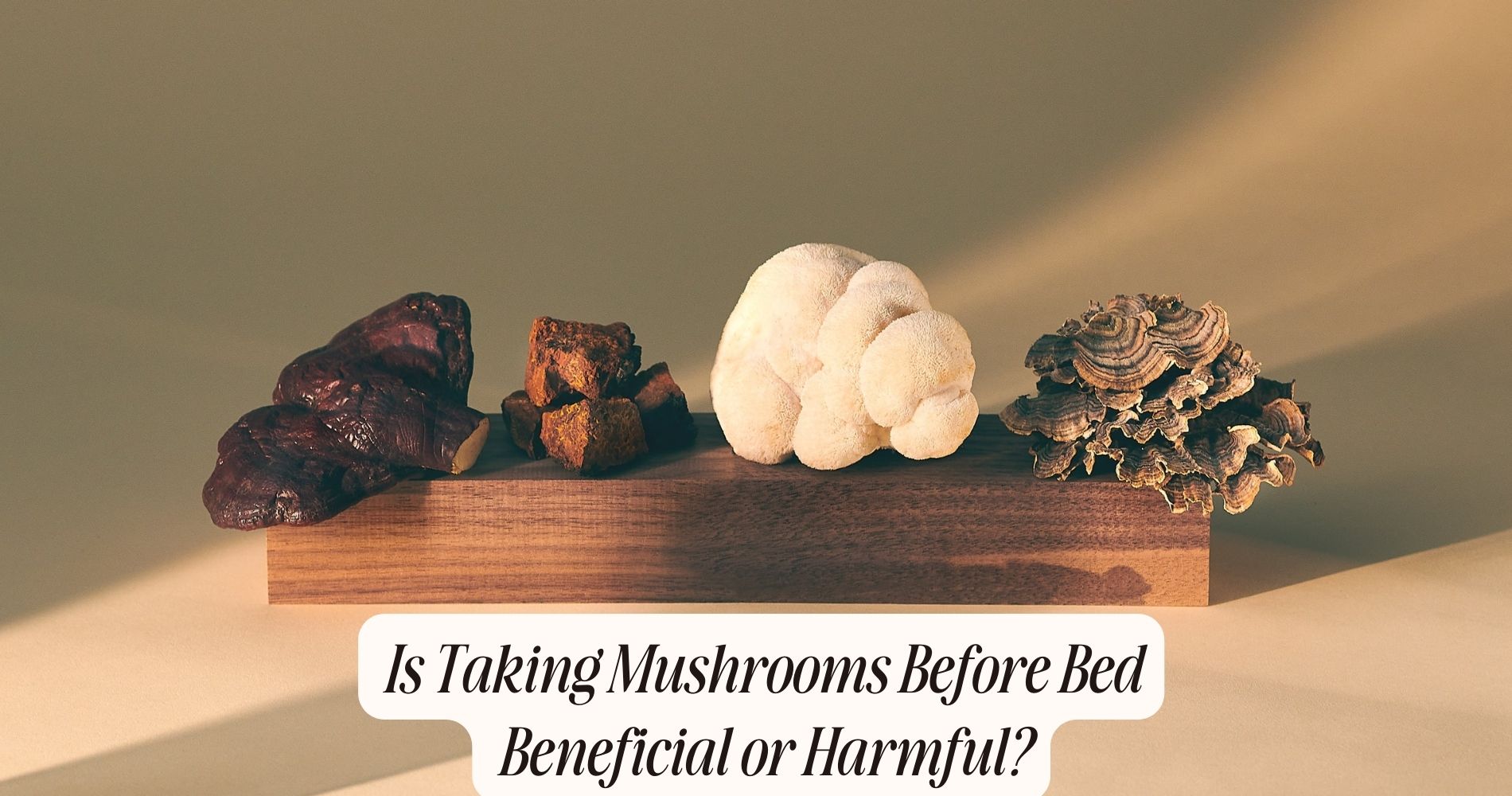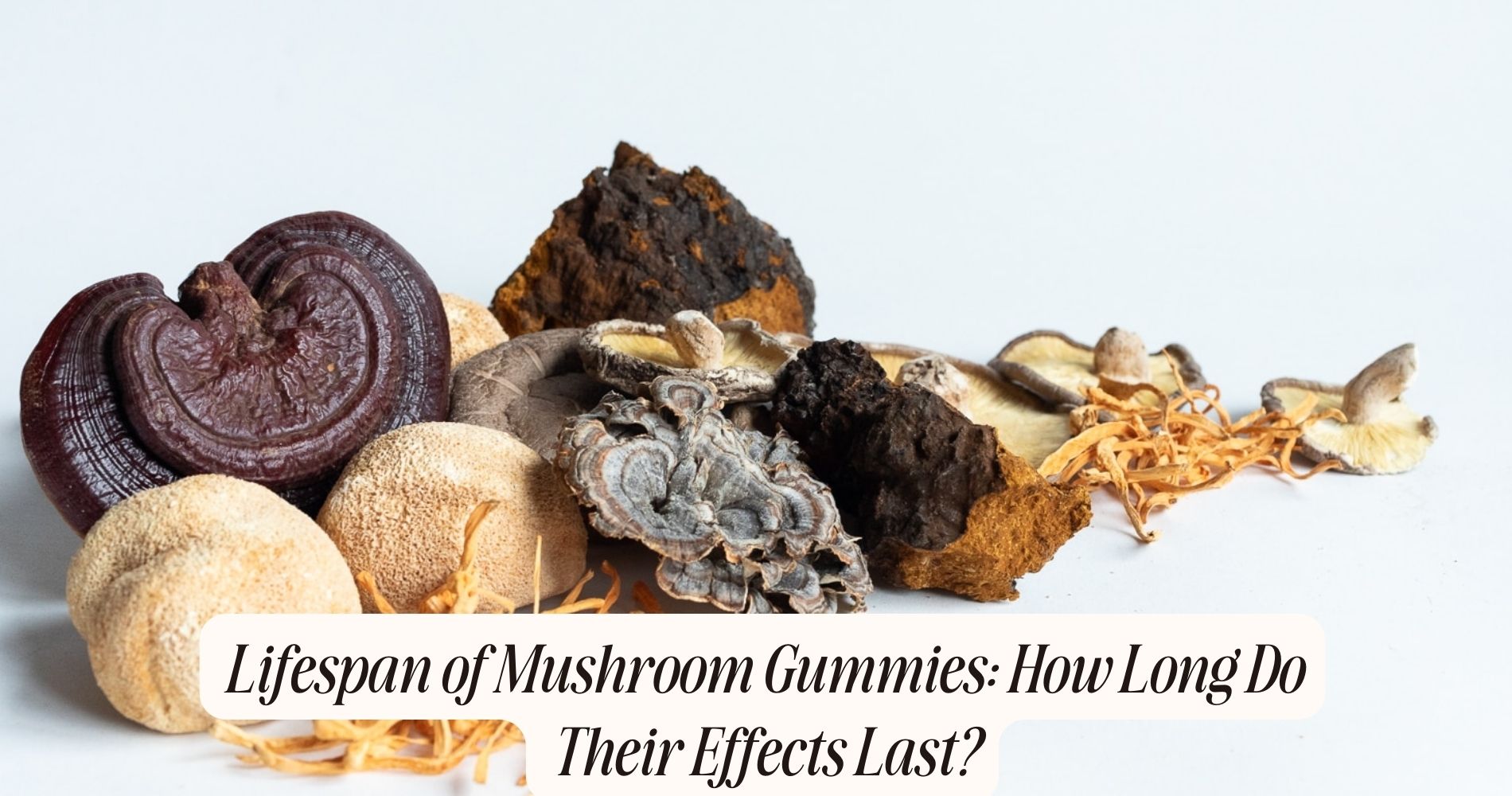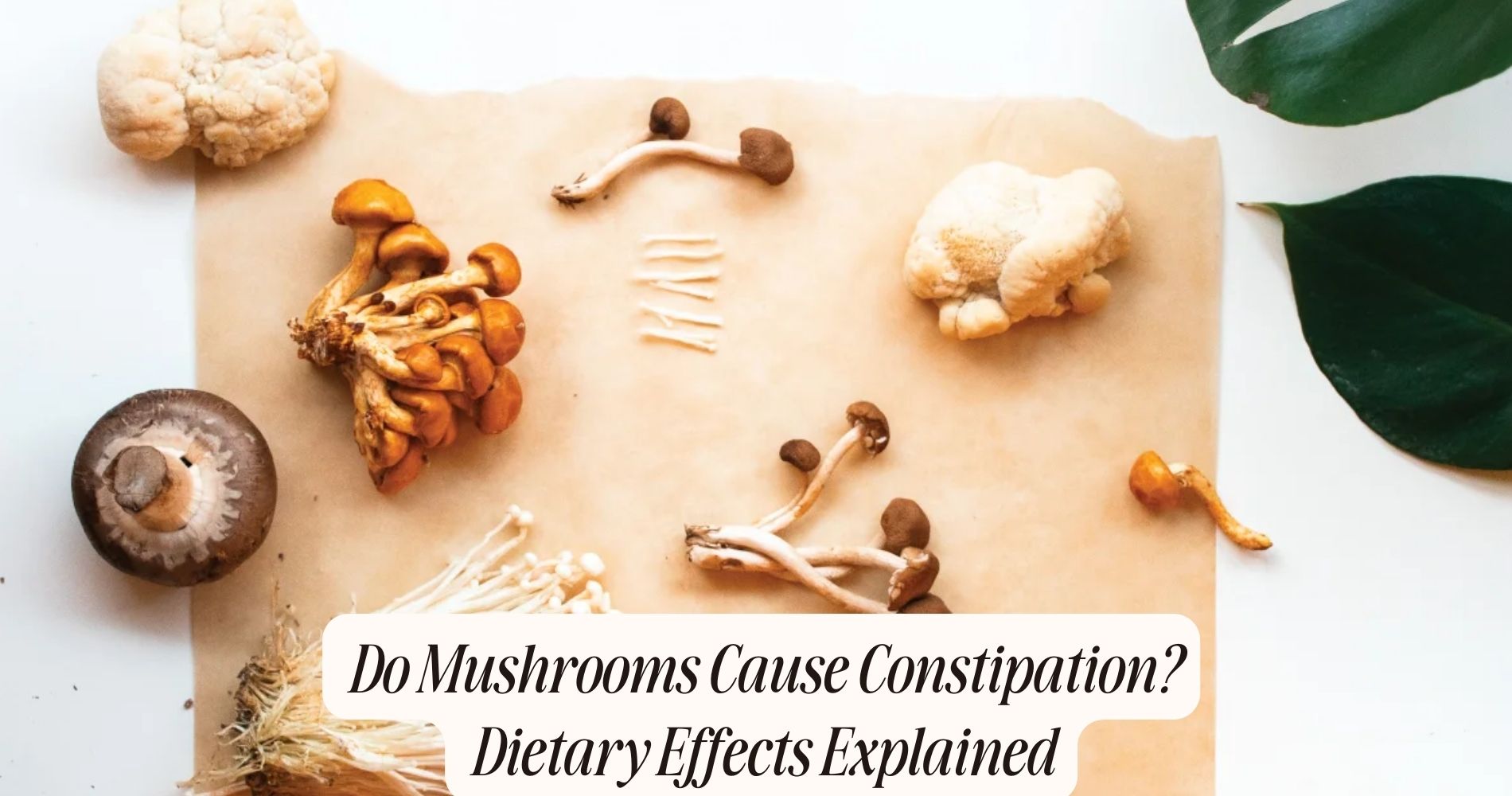
Is Taking Mushrooms Before Bed Beneficial or Harmful?
Taking mushrooms before bed can have varied effects, depending on the type and dosage. Reishi and Lion's Mane mushrooms may enhance sleep quality by promoting relaxation and supporting melatonin production. However, psilocybin-containing mushrooms can disrupt sleep architecture, induce vivid dreams, and affect neurotransmitter balance, leading to sleep disturbances. Additionally, psilocybin might interact with medications, posing further risks. Clinical evidence and expert opinions suggest individual responses can differ substantially, necessitating caution and personalized consideration. To grasp the full scope of potential benefits and risks, exploring more detailed insights is essential.
Types of Mushrooms
There are several types of mushrooms commonly used for their potential health benefits, including Reishi, Lion's Mane, and Chaga. Each of these mushrooms offers unique nutritional benefits and culinary uses.
Reishi mushrooms are rich in polysaccharides, triterpenes, and peptidoglycans, which contribute to their high antioxidant properties. They're often used in soups and teas, providing a mild, earthy flavor. This mushroom is noted for its immunomodulatory effects, which can support your immune system.

Lion's Mane mushrooms contain bioactive substances such as hericenones and erinacines. These compounds may promote cognitive function. In culinary settings, Lion's Mane has a meaty texture, making it a popular substitute for seafood. It's packed with essential amino acids and beneficial polysaccharides, enhancing its nutritional profile.
Chaga mushrooms are rich in betulinic acid, inotodiol, and other compounds with potential anti-inflammatory properties. Often consumed in the form of tea, Chaga has a slightly bitter, earthy taste. This mushroom is known for its high levels of antioxidants, particularly melanin, which can protect your cells from oxidative damage.
Sleep Benefits
Many people find that consuming certain types of mushrooms before bed can enhance sleep quality due to their bioactive compounds and adaptogenic properties. Mushrooms like Reishi and Lion's Mane are often cited for their ability to promote relaxation and reduce stress, which are vital for a good night's sleep. These mushrooms contain compounds that can potentially modulate the body's stress response, making it easier for you to unwind.
Reishi mushrooms, specifically, are known to support melatonin production, a hormone that regulates the sleep-wake cycle. Increased melatonin levels can help you fall asleep faster and enjoy a deeper, more restful sleep. Additionally, the adaptogenic properties of these mushrooms may improve your body's ability to cope with stress, enhancing overall sleep quality.
Incorporating these mushrooms into your nightly routine can complement other relaxation techniques like deep breathing or meditation. By creating a synergistic effect, you can better prepare your body and mind for sleep.
Clinical studies have shown that individuals using these mushrooms report fewer sleep disturbances and improved overall sleep satisfaction, suggesting that these natural supplements can be a valuable addition to your sleep hygiene practices.
Potential Risks
When you take mushrooms before bed, you might experience sleep cycle disruption, which can affect overall sleep quality.
Additionally, some individuals report psychological side effects, including increased anxiety or hallucinations.
It's important to take into account potential interactions with medications you may be taking, as these can exacerbate adverse effects.
Sleep Cycle Disruption
Consuming mushrooms before bed can disrupt the sleep cycle by affecting neurotransmitter balance and altering sleep architecture. Psilocybin, the active compound in many psychedelic mushrooms, influences serotonin receptors in the brain, which play an important role in regulating your circadian rhythm. A disrupted circadian rhythm can lead to irregular sleep patterns and compromise the quality of sleep.
Psilocybin can impact the stages of sleep, including REM sleep, which is essential for cognitive functions like memory consolidation and emotional regulation. Studies have shown that altering neurotransmitter levels can reduce the duration of REM sleep, leading to fragmented sleep cycles and decreased restorative sleep. Interruptions in REM sleep may result in grogginess, reduced cognitive performance, and mood disturbances upon waking.
Moreover, mushrooms can induce vivid and intense dreams, which can further disrupt sleep continuity. These dreams may cause frequent awakenings, preventing you from achieving the deep sleep necessary for physical and mental recovery.

Therefore, while mushrooms may provide other benefits, consuming them before bed poses significant risks to your sleep cycle, potentially affecting overall health and well-being. Always consider these potential disruptions when evaluating the use of mushrooms in proximity to bedtime.
Psychological Side Effects
Psychedelic mushrooms can pose significant psychological side effects, including anxiety, paranoia, and hallucinations. When you consume these substances, the active compound, psilocybin, can alter your brain's chemistry, leading to an increased hallucination risk. This can be particularly concerning when taken before bed, as it may exacerbate feelings of emotional distress, potentially leading to a challenging and uncomfortable experience.
In some cases, individuals may encounter severe anxiety or paranoia, which can manifest as a profound sense of fear or apprehension without a clear cause. These symptoms can disrupt your mental state and interfere with your ability to relax or fall asleep. Such adverse reactions can persist even after the hallucinogenic effects have worn off, leaving you in a heightened state of emotional distress.
Moreover, the hallucination risk associated with psychedelic mushrooms can be unpredictable. Visual and auditory distortions mightn't only be disorienting but can also provoke a strong emotional response. This can be particularly problematic when you're alone and trying to sleep, as the lack of external stimuli to ground your experience may amplify these effects.
Therefore, the psychological side effects of taking mushrooms before bed warrant careful consideration.
Interaction With Medications
While psychological side effects present significant concerns, another critical factor to take into account is the potential interaction between psychedelic mushrooms and medications. If you're taking any form of medication, understanding pharmacological interactions becomes essential.
Psilocybin, the active compound in psychedelic mushrooms, can alter the metabolism of various drugs, potentially leading to adverse effects or diminished efficacy.
For example, selective serotonin reuptake inhibitors (SSRIs), commonly used antidepressants, are contraindicated medications with psilocybin. SSRIs and psilocybin both influence serotonin levels, and combining them could lead to serotonin syndrome, a potentially life-threatening condition characterized by agitation, confusion, rapid heart rate, and high blood pressure.
Additionally, individuals on antipsychotic medications should avoid psilocybin. Antipsychotics can counteract the effects of psilocybin, leading to unpredictable mental states and possibly exacerbating psychiatric symptoms.
Blood pressure medications also warrant caution, as psilocybin can cause fluctuations in blood pressure, complicating the management of hypertension.
Even over-the-counter drugs like antihistamines may interact unfavorably with psilocybin, causing unexpected side effects. Hence, if you're considering taking mushrooms before bed, consult a healthcare provider to discuss any potential pharmacological interactions and safeguard your safety.
Scientific Research
Numerous studies have investigated the effects of ingesting mushrooms, particularly those containing psilocybin, on sleep patterns and overall sleep quality. Clinical studies indicate that psilocybin's neurological effects can greatly alter brain activity. These studies observe that psilocybin influences serotonin receptors, particularly 5-HT2A, which play an essential role in regulating mood, cognition, and the sleep-wake cycle.
One prominent clinical study found that low doses of psilocybin could potentially improve sleep quality by reducing the frequency of REM sleep, thereby increasing the time spent in deep sleep stages that are vital for restorative processes. However, it's worth mentioning that high doses led to disrupted sleep patterns and vivid, often disturbing dreams.
Additionally, research demonstrates that psilocybin can increase neuroplasticity, potentially aiding in the treatment of sleep disorders linked to anxiety and depression. Despite these promising findings, the overall impact of psilocybin on sleep is complex and varies depending on dosage, individual physiology, and mental health status.
Given these mixed results, more thorough and longitudinal studies are necessary to fully understand the implications of taking psilocybin-containing mushrooms before bed. This evidence underscores the need for caution and further exploration in this area.
Personal Experiences
You've likely heard anecdotal reports that taking mushrooms before bed can enhance dream vividness, alter sleep quality, and increase emotional intensity. These personal experiences, while subjective, align with clinical observations regarding the psychoactive effects of mushrooms.
Understanding these accounts can provide valuable insights into the broader implications of pre-sleep mushroom consumption.
Enhanced Dream Vividness
Many individuals report experiencing much more vivid and memorable dreams after consuming mushrooms before bed. Enhanced dream vividness is often cited as a notable effect, potentially linked to the psychoactive compounds in mushrooms. This phenomenon can also lead to lucid dreaming, where you become aware that you're dreaming and can exert some control over the dream's narrative.
To objectively assess these experiences, dream journaling can be a useful tool. By documenting your dreams, you can track changes in vividness and recall over time. Research indicates that psychoactive substances may alter the brain's neurotransmitter activity, particularly serotonin levels, which can impact the dream state.

Subjective reports suggest that these altered states of consciousness may enhance the sensory details and emotional intensity of dreams. However, it's important to note that individual responses can vary significantly. Factors such as dosage, individual neurochemistry, and pre-existing mental health conditions play vital roles.
Sleep Quality Alterations
Anecdotal evidence suggests that consuming mushrooms before bed can greatly alter sleep quality, with users reporting a range of effects from enhanced restfulness to increased sleep disturbances. Some individuals have noted a significant improvement in their ability to fall asleep quickly, indicating a reduction in sleep latency. This suggests that mushrooms might interact with your circadian rhythms, potentially promoting an earlier onset of sleep.
However, other personal accounts highlight significant disruptions in sleep patterns. You might experience frequent awakenings or an inability to enter deep sleep stages, which are vital for restorative rest. Such disturbances can offset any initial ease in falling asleep, making overall sleep quality less predictable.
It's essential, crucial to take into account the variability in these reports. While some users find that their sleep becomes more restful and consistent, others encounter heightened sleep disturbances that can interfere with daily functioning. Variations in individual physiology, mushroom dosage, and timing of consumption all likely contribute to these differing experiences.
Understanding how mushrooms interact with circadian rhythms and sleep latency provides valuable insights but underscores the need for further clinical studies to establish clear guidelines and recommendations.
Emotional Intensity Increase
Reports also indicate that consuming mushrooms before bed may lead to an increase in emotional intensity, with users experiencing heightened emotions during their sleep cycle. This phenomenon is often characterized by vivid dreams and a more profound emotional engagement with dream content. Individuals have reported a range of emotional responses, including joy, fear, and sadness, which can be markedly amplified.
From a clinical perspective, this increase in emotional intensity may have implications for stress management. On one hand, heightened emotional experiences could potentially facilitate emotional processing and lead to a better understanding of underlying stressors. On the other hand, intensified emotions may result in mood swings that could be disruptive to your overall mental well-being.
In terms of practical application, it's important to monitor how these emotional fluctuations affect your daily life. If you notice that your mood swings become more pronounced or that your stress levels increase, it may be advisable to reconsider the timing and dosage of mushroom consumption.
Consulting a healthcare professional can also offer personalized insights and recommendations, ensuring that your approach to using mushrooms aligns with your mental health goals and stress management strategies.
Dosage Guidelines
Determining the appropriate dosage of mushrooms for sleep involves taking into account factors such as body weight, tolerance, and desired effects. When using microdosing techniques, it's crucial to use precise measuring equipment to achieve consistent results. Typically, a microdose ranges from 0.1 to 0.3 grams of dried mushrooms. For individuals new to this practice, starting with the lower end of the spectrum can help gauge personal sensitivity and tolerance.
Accurate measurement is pivotal. Digital scales with high precision are recommended to make sure the dose stays within the microdosing range. This helps in minimizing the risk of unexpected psychoactive effects, which can be counterproductive to sleep.

For individuals with higher body weight or greater tolerance, slight adjustments might be necessary, but it's advisable to make incremental changes and monitor the results closely. Keeping a dosage journal can aid in tracking the effects and adjusting as needed.
It's also important to take into account the specific type of mushroom used, as potency can vary between species. Psilocybe cubensis, for instance, is commonly used due to its moderate potency. By adhering to these guidelines, you can optimize the potential benefits of using mushrooms as a sleep aid while minimizing any adverse effects.
Final Thoughts
Incorporating mushrooms into your nightly routine can potentially enhance sleep quality, provided that dosages are meticulously managed and individual responses are carefully monitored. Research indicates that certain compounds in mushrooms, such as tryptophan and melatonin, may facilitate sleep induction and improve sleep architecture. However, it's essential to ponder the long term effects, particularly the impact on neurochemistry and sleep cycles, when integrating mushrooms into your regimen.
Furthermore, the cultural significance of mushrooms in traditional medicine shouldn't be overlooked. Various cultures have utilized mushrooms for centuries to promote relaxation and improve sleep. This historical context provides anecdotal support for their effectiveness, though modern clinical trials are necessary to substantiate these claims scientifically.
Adherence to appropriate dosage guidelines minimizes potential adverse effects and optimizes therapeutic outcomes. Individual variability in response to mushroom compounds necessitates a personalized approach, potentially involving consultation with healthcare professionals. Ongoing research and clinical trials will continue to elucidate the safety and efficacy of mushrooms as sleep aids.
Frequently Asked Questions
Can Mushrooms Affect the Quality of Dreams?
Yes, mushrooms can affect the quality of dreams. They might enhance lucid dreaming by influencing sleep cycles. However, scientific evidence on their impact is limited, so consult a healthcare professional before considering their use.
Are There Specific Strains Better for Nighttime Use?
You should consider strains like Reishi for nighttime use. Research shows Reishi can positively impact sleep cycles. Guarantee proper dosage timing, typically 30-60 minutes before bed, to maximize its benefits on sleep quality.
Do Mushrooms Interact With Common Sleep Medications?
You should consider possible medication synergy and contraindication risks when combining mushrooms with common sleep medications. Evidence suggests certain compounds in mushrooms may interact adversely, potentially affecting the efficacy and safety of your prescribed treatments.
How Does Microdosing Compare to Full Doses Before Bed?
When considering dosage timing, microdosing typically results in less tolerance build-up compared to full doses before bed. Microdosing may offer milder effects, potentially reducing the risk of sleep disruption and adverse interactions with sleep medications.
What Are the Legal Implications of Using Mushrooms for Sleep?
When considering the legal status and medical research, you must understand that psilocybin mushrooms are illegal in many jurisdictions. Always consult local laws and current clinical studies before using mushrooms for sleep-related purposes.
Conclusion
In conclusion, taking mushrooms before bed can offer potential sleep benefits, such as improved sleep quality and relaxation, but it also carries risks like altered mental states and disrupted sleep cycles. Scientific research is still evolving, and expert opinions vary.
Personal experiences are highly individual, making it important to follow dosage guidelines and consult healthcare professionals. Ultimately, more robust studies are needed to draw definitive conclusions on the safety and efficacy of this practice.




